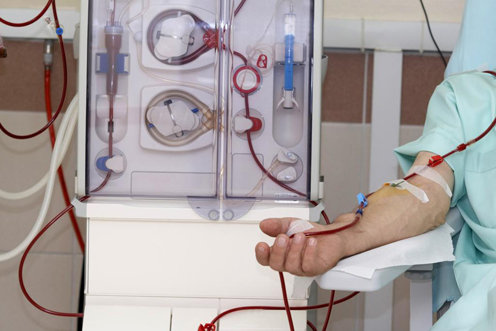Kidney Dialysis
Kidney dialysis is a life-saving treatment for people with kidney failure. It helps to remove waste products and excess fluids from the blood when the kidneys are no longer able to do so. Understanding kidney dialysis is essential for those who require this treatment to manage their condition.

What is Kidney Dialysis?
Kidney dialysis is a medical procedure that replicates the function of the kidneys by removing waste products and excess fluids from the blood. It is used to treat people with kidney failure, also known as end-stage renal disease (ESRD), whose kidneys can no longer perform these functions effectively.
Types of Kidney Dialysis
There are two main types of kidney dialysis:
- Hemodialysis: A machine filters the blood outside the body and then returns it to the body.
- Peritoneal dialysis: The lining of the abdomen acts as a natural filter, and dialysis fluid is introduced and drained from the abdominal cavity.
Hemodialysis
Hemodialysis is typically performed at a dialysis center or hospital. During hemodialysis, blood is pumped through a machine called a dialyzer, which filters out waste products and excess fluids. The cleaned blood is then returned to the body. Hemodialysis is usually done three times a week, with each session lasting several hours.
Peritoneal Dialysis
Peritoneal dialysis is performed at home. A catheter is surgically placed in the abdomen, and dialysis fluid is introduced into the abdominal cavity. The peritoneal membrane acts as a filter, and waste products and excess fluids pass into the dialysis fluid. The fluid is then drained from the abdomen and replaced with fresh fluid several times a day.
When is Dialysis Needed?
Dialysis is needed when the kidneys are no longer able to remove waste products and excess fluids from the blood effectively. This can occur due to chronic kidney disease, acute kidney injury, or other kidney-related conditions. Dialysis is a life-saving treatment for people with kidney failure.
Preparing for Dialysis
Preparing for dialysis involves making lifestyle changes, such as following a special diet, managing medications, and arranging transportation to and from dialysis appointments. It also involves undergoing medical tests to assess the health of the kidneys and determine the most appropriate type of dialysis.
The Dialysis Procedure
During the dialysis procedure, the patient is connected to a dialysis machine, and blood is pumped through the machine to remove waste products and excess fluids. The duration of the procedure depends on the type of dialysis and the patient's individual needs.
Benefits and Risks of Dialysis
The benefits of dialysis include improved quality of life and prolonged survival for people with kidney failure. However, there are also risks associated with dialysis, such as infection, blood clots, and changes in blood pressure. These risks are minimized through careful monitoring and adherence to treatment protocols.
Managing Life on Dialysis
Managing life on dialysis involves adhering to a strict treatment schedule, following a special diet, taking medications as prescribed, and attending regular medical appointments. It also involves staying active and engaged in activities that improve overall health and well-being.
Diet and Nutrition for Dialysis Patients
Diet and nutrition play a crucial role in managing kidney failure and dialysis. A dietitian can help develop a meal plan that is appropriate for someone on dialysis, taking into account their individual needs and dietary restrictions. It is essential to monitor fluid intake, limit potassium, phosphorus, and sodium, and ensure an adequate intake of protein.
Common Complications of Dialysis
Common complications of dialysis include infection, blood clots, low blood pressure, muscle cramps, and fluid overload. These complications can be managed through careful monitoring and prompt medical intervention.
Hyderabad MultiSpeciality Hospital's Dialysis Services
Hyderabad MultiSpeciality Hospital offers comprehensive dialysis services for people with kidney failure. Our state-of-the-art dialysis centers are staffed by a team of experienced nephrologists, dialysis nurses, and dietitians who provide personalized care and support to patients undergoing dialysis.
Innovative Technologies in Dialysis Treatment
Our hospital is equipped with the latest technologies in dialysis treatment, including advanced dialysis machines, remote monitoring systems, and telemedicine services. These technologies help to improve the accuracy and efficiency of dialysis treatment, ensuring the best possible outcomes for our patients.
Support and Counseling for Dialysis Patients
We understand that undergoing dialysis can be challenging, both physically and emotionally. That's why we offer a range of support services, including counseling, support groups, and educational resources, to help patients cope with the demands of dialysis treatment. Our goal is to provide comprehensive care that addresses the holistic needs of our patients.
Patient Stories and Testimonials
Patient stories and testimonials highlight the positive impact of dialysis on the lives of our patients. These stories provide hope and inspiration to others facing similar challenges and underscore the quality of care provided at Hyderabad MultiSpeciality Hospital.
FAQs About Kidney Dialysis
1. How long does dialysis treatment last?
The duration of dialysis treatment depends on the type of dialysis and the individual's needs. Hemodialysis sessions typically last three to four hours and are done three times a week. Peritoneal dialysis involves daily exchanges that take about 30 minutes each.
2. Can dialysis be done at home?
Yes, peritoneal dialysis can be done at home. Patients receive training on how to perform peritoneal dialysis and manage their treatment at home